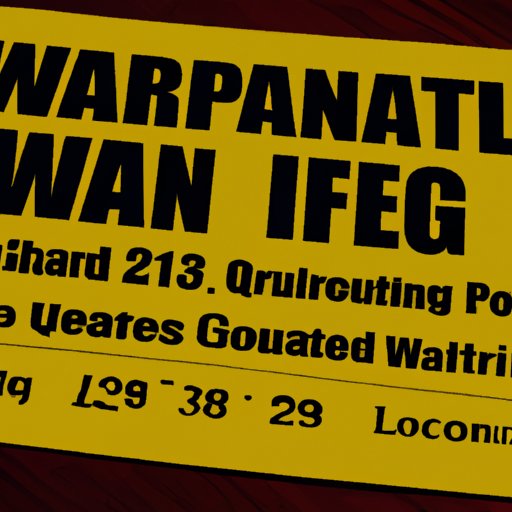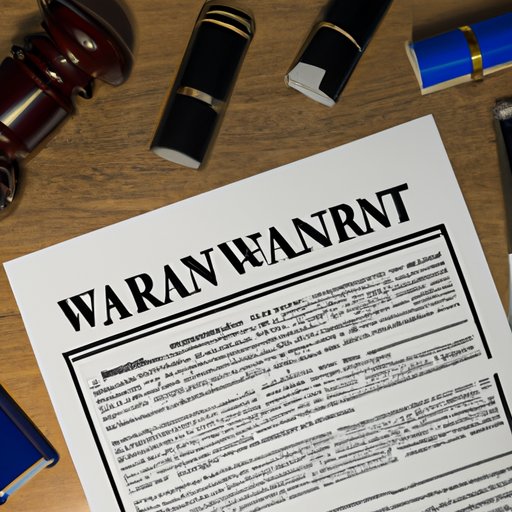Introduction
When it comes to criminal justice, one of the most important steps is obtaining a warrant. A warrant is an official document issued by a court or magistrate that authorizes law enforcement officials to search a person’s property or arrest them. It is an important tool for law enforcement as it helps ensure that individuals’ rights are respected and that investigations are conducted in an ethical manner. But how long does it take to get a warrant? This article will explore the process of obtaining a warrant and the factors that affect the timeline for obtaining a warrant.
Exploring the Process of Obtaining a Warrant: How Long Does It Take?
Before discussing the timeline for obtaining a warrant, it’s important to understand the steps involved in the process. Generally speaking, the process of obtaining a warrant involves the following steps:
- Law enforcement officers must first identify a suspect and conduct an investigation into their activities.
- The officers must then present evidence of the suspect’s wrongdoing to a judge or magistrate.
- If the judge or magistrate finds probable cause to believe that the suspect has committed a crime, they will issue a warrant authorizing law enforcement officers to search the suspect’s property or arrest them.
It is important to note that the timeline for obtaining a warrant can vary depending on the particular situation. There are several factors that can affect the amount of time it takes to get a warrant, including the type of warrant, the jurisdiction, and the availability of resources. Below, we will discuss some of these factors in more detail.

What You Need to Know About the Length of Time for Getting a Warrant
In order to understand the timeline for obtaining a warrant, it is important to have a basic understanding of the legalities involved. Generally speaking, there are two types of warrants: state warrants and federal warrants. State warrants are usually issued by a state court or magistrate within the same state where the crime was committed. Federal warrants are issued by a federal court or magistrate, and they are typically used when dealing with cases involving interstate crimes.
Another factor that affects the timeline for obtaining a warrant is the jurisdiction. Different jurisdictions may have different procedures and timelines for obtaining a warrant. For example, some jurisdictions may require law enforcement officers to obtain multiple warrants if they wish to search multiple locations. Additionally, some jurisdictions may have more stringent requirements for obtaining a warrant than others.
A Comprehensive Guide to Understanding the Timeline for Obtaining a Warrant
Now that you have a basic understanding of the legalities associated with obtaining a warrant, let’s take a look at the expected time frame for getting a warrant. Generally speaking, the timeline for obtaining a warrant can range from a few hours to several days, depending on the particular situation. However, there are some common delays that can add additional time to the process.
For example, if the suspect has been arrested, the warrant process may be delayed while the suspect is processed and booked into jail. Additionally, if the warrant is being issued in another jurisdiction, it may take longer to receive the warrant due to the need to transfer paperwork between jurisdictions. Finally, if the warrant requires additional documentation or signatures, this can also add additional time to the process.

The Legalities Behind How Long it Takes to Get a Warrant
There are several other factors that can affect the amount of time it takes to receive a warrant. First, it is important to understand the different types of warrants and their associated timelines. For example, arrest warrants are typically issued quickly, while search warrants may take longer as they often require additional paperwork and signatures from multiple parties.
Additionally, it is possible to expedite the warrant process in certain situations. For example, if the suspect is believed to be in imminent danger, law enforcement officers may be able to obtain a warrant more quickly. Additionally, if the suspect is believed to be in possession of evidence that could be destroyed or tampered with, law enforcement officers may be able to expedite the warrant process in order to prevent the destruction of evidence.

Examining Factors that Affect the Amount of Time it Takes to Receive a Warrant
Finally, it is important to understand the role of law enforcement in the warrant process. Law enforcement officers must gather all necessary evidence, fill out the appropriate paperwork, and present it to a judge or magistrate in order to receive a warrant. If any of these steps are done incorrectly or incompletely, it can add additional time to the process.
Additionally, it is important to make sure that all paperwork is filed correctly. If paperwork is filled out incorrectly or incompletely, it can add additional time to the process. Additionally, if the paperwork is not filed in a timely manner, it can delay the process even further.
Conclusion
In conclusion, obtaining a warrant is an important step in the criminal justice process. The timeline for obtaining a warrant can vary depending on several factors, including the type of warrant, the jurisdiction, and the availability of resources. Additionally, understanding the legalities behind warrants, different types of warrants, and how to expedite the process can help minimize wait times when obtaining a warrant.
(Note: Is this article not meeting your expectations? Do you have knowledge or insights to share? Unlock new opportunities and expand your reach by joining our authors team. Click Registration to join us and share your expertise with our readers.)
